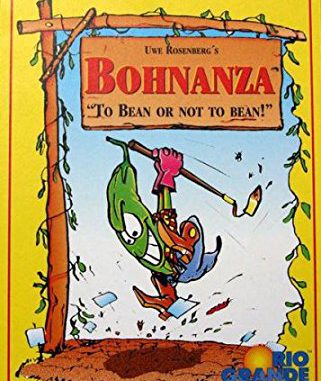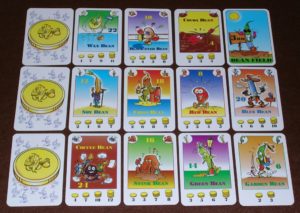
Christmas was very kind to us in terms of gaming. We received at least six games I can think of off the top of my head. I’m going to review all of them because there are some interesting ones. But I’m going to start with an unexpected gem, one of the games I’d neither played nor even heard of before; Bohnanza.
In Bohnanza you play as a bean farmer trying to make a living growing and selling some rather eccentric beans. The game is for 2-7 players and there are few slight rule variants depending on how many players there are. But the basics are the same. Each player has a hand of cards, the order of which you cannot change, and a limited number of bean fields (2-3 depending on number of players).
 Each turn you are required to plant the first bean card in your hand. You can add it to a group of similar beans (there are up to 11 varieties of beans), or plant it in an empty field. You must first harvest beans already planted if there is no room. This is where the difficult strategy for the game lies.
Each turn you are required to plant the first bean card in your hand. You can add it to a group of similar beans (there are up to 11 varieties of beans), or plant it in an empty field. You must first harvest beans already planted if there is no room. This is where the difficult strategy for the game lies.
When you harvest beans, you get gold based on how many beans you harvest. Each bean operates on a different scale. Some beans, you get one gold for harvesting four beans. Others it’s a much nicer one gold for two beans. But for all of them, the more you have the better the ratio works to your favor. Where one or two beans might get you nothing, seven might get you as many as four gold. It’s in your best interest to wait to harvest when you have the ideal ratio.
This is why having to plant whatever bean is in the front of your hand can be problematic. If you have a bean that doesn’t match anything in your field, you have to harvest something. And if you’re one bean short of getting the best return, tough luck.
While you cannot rearrange your hand, you do have some control over it. After playing your first card you have the option to plant a second card. This gives you some leeway on when cards come to the front.
Once you’ve played, you then draw two cards face up. These two cards will also need to be planted (they do not go into your hand) but before you do, you have the chance to trade them. This is where the strategy comes into play. If you flip over beans you can use, you are free to keep them and plant them. But, more likely, you flip over beans someone else might want and you can trade them.
The others players trade you a bean card from their hand. Both beans traded are now ready to be planted and do not go into either player’s hand. This means if a player has a bean they don’t want at the front of their hand, they will be eager to trade it to you. Deciding when to trade, adjusting your hand to help yourself, versus when not to trade, in order to deny an opponent a good return on a harvest can be devilish.
At the very end of your turn, you draw three new cards (or in one variant, every player draws one card every turn). This ensures that after your turn you always have cards ready to trade and cards coming into your hand that are going to mess up your growth plans.
The game continues until the draw deck is exhausted. Then all discarded cards are shuffled and a new deck is created. This will happen once or twice. Each time, the available bean cards changes and you need to keep track of what’s still available. Now, you’re probably asking yourself, if all the discarded cards are shuffled, what do you need to keep track of?
Well, remember how you get gold from beans? Well, the gold you get is those bean cards flipped over. Take the Green Bean for example. There are fourteen total Green Bean cards (this number is shown at the top of each card). If you harvest seven of them, you’ll receive four gold. That takes four of the Green Bean cards out of the game. So when the deck gets shuffled again, there are now only ten available, decreasing the odds of finding them and decreasing your potential reward. If two people manage to harvest seven in the first round, on the second there will only be six left, meaning you can’t get the max payout from them.
Overall it’s a fun game that moves rapidly. The first time through the deck takes significantly longer than the next two. There is strategy involved but nothing too complicated. You need to decide what to trade but you can’t plan much because there is a fair amount of randomness to everything. I recommend it for a family game night.
Wayne Basta
Latest posts by Wayne Basta (see all)
- X-Wing Tier List – Rebels - May 10, 2023
